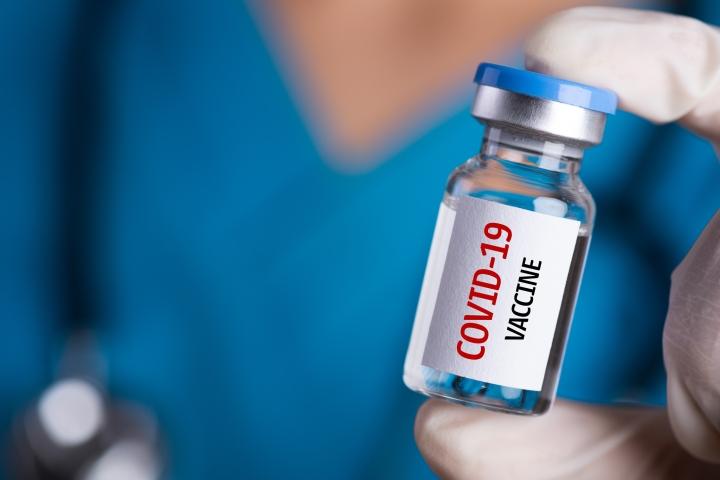Technology developed by a team of scientists at Dartmouth, including faculty, postdoctoral researchers, and graduate students, that contributed to the development of COVID-19 vaccines will allow Dartmouth to make major investments into advancing its research and education enterprise.
The discovery at Dartmouth’s Geisel School of Medicine was instrumental in quickly bringing to market the COVID-19 vaccines credited with preventing more than 18 million hospitalizations and more than three million deaths in the U.S. alone. The underlying research, conducted by Professor Jason McLellan and his team at Geisel with collaborators at the Scripps Research Institute and the National Institute for Allergy and Infectious Diseases, started in 2014 and culminated in 2016 with the development of a method to stabilize coronavirus spike proteins for use as vaccine antigens.
In December 2022, the National Institutes of Health—which shares ownership of the intellectual property from the research with the other collaborating academic institutions—finalized terms of an agreement with Moderna. The recent agreement follows similar licenses to this technology between the NIH and several other vaccine companies, including BioNTech SE.
Dartmouth plans to reinvest the revenue generated from this technology into strengthening the institution’s research and education enterprise and advancing work that has the potential to save millions of lives and improve global health.
“This kind of scientific breakthrough demonstrates the impact of the innovative work that happens at Dartmouth,” says President Philip J. Hanlon ’77. “It is a testament to our long-standing commitment to research; a collaborative culture created by faculty, students, and staff; and the strength of the research enterprise at the Geisel School of Medicine. The success of this technology enables us to increase our investment in growing the research support and resources we need to continue to develop the breakthroughs that make the world a better, more inhabitable place.”
The technology was developed by McLellan, when he was on the Geisel faculty, and a team of scientists including postdoctoral researcher Nianshuang Wang and Daniel Wrapp, a talented graduate student who went on to earn a PhD from Dartmouth’s Guarini School of Graduate and Advanced Studies in 2021. In McLellan’s lab at Geisel, the team identified an urgent problem in need of solving: how to stabilize the highly labile spike proteins that are common to all coronaviruses to make them better vaccine antigens.
Similar research was underway around the globe, spurred by the outbreak of SARS-CoV, another coronavirus epidemic that killed nearly 800 people worldwide between 2002 and 2004. Researchers, anxiously preparing for the inevitability of another infectious outbreak, raced to map the enigmatic structure of these coronavirus spike proteins—an essential step on the path to vaccine development.
“Improving people’s lives is exactly what drew me to science and what I hoped to achieve while developing vaccine technology at Dartmouth,” McLellan says. “Finding solutions to complex, real-life challenges is a race against the clock, and it’s only possible through the kind of collaboration and community I developed with my colleagues.”
McLellan and his team finally cracked the code, first by determining a high-resolution three-dimensional structure of a coronavirus spike protein. With an atomic model of the spike protein in hand, they were able to engineer a modified form of the protein, which produced high titers of virus-neutralizing antibodies when injected into mice. This antigen modification strategy—an approach that also holds promise for respiratory syncytial virus (RSV) vaccines—proved essential in 2020 when scientists and vaccine developers around the world rushed to create a vaccine against SARS-CoV-2, the causative agent of COVID-19.
“The research behind the COVID-19 vaccines highlights how discoveries by faculty and trainees in our medical school have direct and tangible impact on human lives,” says Duane Compton, dean of the Geisel School of Medicine. “Dr. McLellan’s discovery is already credited with saving millions of lives, and it is a powerful example for how basic and translational science research improves people’s lives. We are excited about how these funds will amplify this important mission at Geisel and for how it will support our training programs for the next generation of biomedical researchers.”
McLellan last year was the recipient of Dartmouth’s inaugural McGuire Family Prize for Societal Impact for his groundbreaking coronavirus research at Geisel.
Dartmouth has a long history of seeking solutions to the world’s most challenging problems and pursuing medical innovation powered in part by collaborative efforts among faculty and students. It was at the forefront in the development of cancer immunotherapy, which has dramatically improved survival rates for certain types of cancer, and is home to the Dartmouth Atlas of Health Care, the first comprehensive documentation of patterns and variations in US medical practice.
Dartmouth also was the site of the first-ever clinical X-ray (1896) and the birth of the BASIC computer programming language (1964); has produced three Nobel Prize winners, including Barry Sharpless ’63 (one of only five scientists to win twice, including most recently in 2022); 17 Rhodes Scholars; and nearly 300 Fulbright fellows. Dartmouth is one of the 65 leading research universities of the American Association of Universities and one of only 146 Carnegie Classification R1 research universities and colleges.
“We have a responsibility to our students, faculty, and staff to continue providing the state-of-the-art facilities and support they need to learn and study science at the highest level,” says Provost David Kotz ’86. “But the responsibility is not just to ourselves. Our work has a real-world impact, and we intend to continue pushing the boundaries of research to benefit people around the world.”
